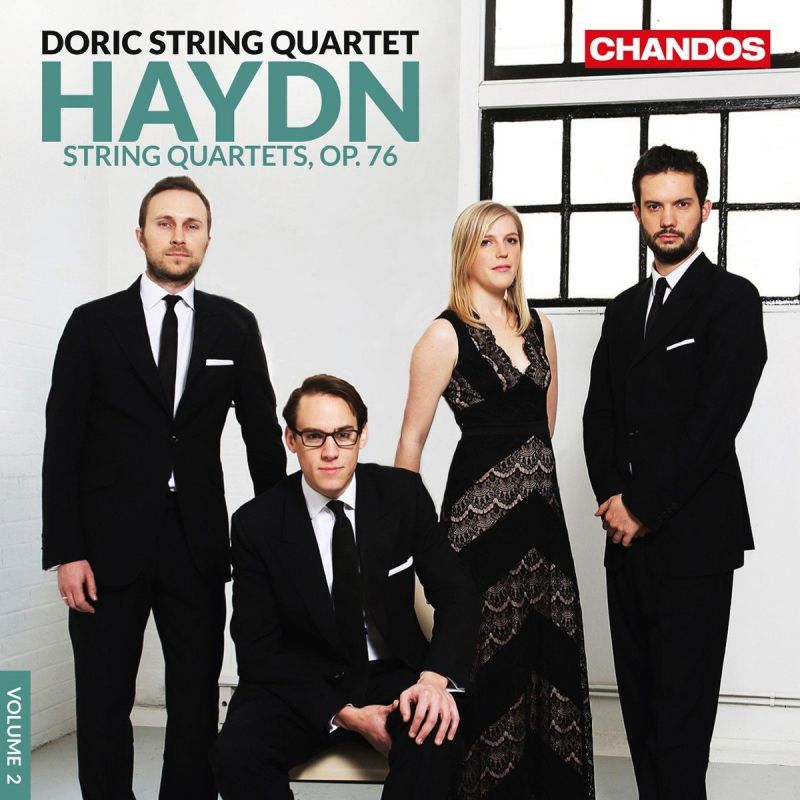HAYDN String Quartets Op 76
View record and artist detailsRecord and Artist Details
Composer or Director: Joseph Haydn
Genre:
Chamber
Label: Chandos
Magazine Review Date: 03/2016
Media Format: CD or Download
Media Runtime: 147
Mastering:
DDD
Catalogue Number: CHAN10886

Tracks:
| Composition | Artist Credit |
|---|---|
| (6) String Quartets, 'Erdödy' |
Joseph Haydn, Composer
Doric String Quartet Joseph Haydn, Composer |
Author: Richard Wigmore
The two indispensable recordings of these endlessly surprising works have long been the highly strung Lindsays and the refined, sinewy Mosaïques, using gut strings and classical bows. Giving more ‘extreme’ performances than either, the Doric live up to the expectations aroused by their probing recordings of Op 20 (12/14). No quartet in my experience has employed such a wide range of colour and dynamics in this music, often with revelatory results: their blanched, disembodied pianissimo in the visionary modulations in the finale of Op 76 No 1; or the sudden veiling of their tone to illuminate Haydn’s magical shift from C minor to D flat in the finale of the Emperor (No 3); or, at the other end of the spectrum, their gloriously raucous bagpipe evocations, whether in the finale of No 5 (a tour de force of controlled bucolic delirium) or in the first movement of No 3, where we momentarily seem to have strayed into the Edinburgh Tattoo.
The Doric’s inventive, no-holds-barred characterisation can have its downside. Even after several hearings I’m unconvinced by the glorious first movement of the Sunrise (No 4), where the Doric lurch between musing/rhapsodic (the opening page unfolds like a slow introduction) and fast/frenetic. With a subtle flexibility of tempo, both The Lindsays and the Mosaïques succeed in integrating the movement’s extreme contrasts. Similarly, the emergence of an unsullied G major, after so much tense, combative G minor, in the finale of No 1 provokes a drastically slowed-down tempo that then necessitates a spurt forwards for the animated triplet figuration. In this movement and elsewhere, too, the Doric’s fondness for distending pauses and rests can compromise the balance of Haydn’s phrase structures.
That said, the Doric have evidently pondered this music deeply and taken nothing for granted. I can’t remember hearing the troubled and obsessive first movement of the D minor, No 2, saturated by its initial falling fifths motif, played with such mingled fire and inwardness, or the elusive opening movement of No 6 so thoughtfully characterised (the second variation unusually boisterous, the third remote and speculative) – and, more than rival quartets, the Doric make a clear and necessary contrast between the Allegretto of the variations and the Allegro of the concluding fugue. I particulary relished the detailed, individual characterisation of the minuets and trios. Has the D major-minor collision in the Trio of No 2 ever sounded so brutal (the Scherzo of Bruckner’s Ninth espied on the horizon), or the inspired play with E flat scales in the Trio of No 6 so shrouded and secretive, all the more telling after the zany exuberance of the Scherzo?
If the Doric are arguably too deliberate in the serenading Andante più tosto allegretto of No 2, they match The Lindsays’ mesmeric intensity in the sublime slow movements of the other quartets – high praise indeed. Eschewing vibrato (a feature of much of their playing), they evoke a grave consort of viols at the opening of No 1’ s Adagio, and feel each of Haydn’s breathtaking harmonic shifts in their hauntingly innig account of the Largo e mesto of No 5. If The Lindsays and the Mosaïques remain safer recommendations, the Doric’s daring, imaginative and technically superb performances demand to be heard. The recording, made in Potton Hall, Dunwich, imparts an ideal glow to the sonorities, while Dean Sutcliffe contributes a typically thought-provoking note.
Discover the world's largest classical music catalogue with Presto Music.

Gramophone Digital Club
- Digital Edition
- Digital Archive
- Reviews Database
- Full website access
From £8.75 / month
Subscribe
Gramophone Full Club
- Print Edition
- Digital Edition
- Digital Archive
- Reviews Database
- Full website access
From £11.00 / month
Subscribe
If you are a library, university or other organisation that would be interested in an institutional subscription to Gramophone please click here for further information.




